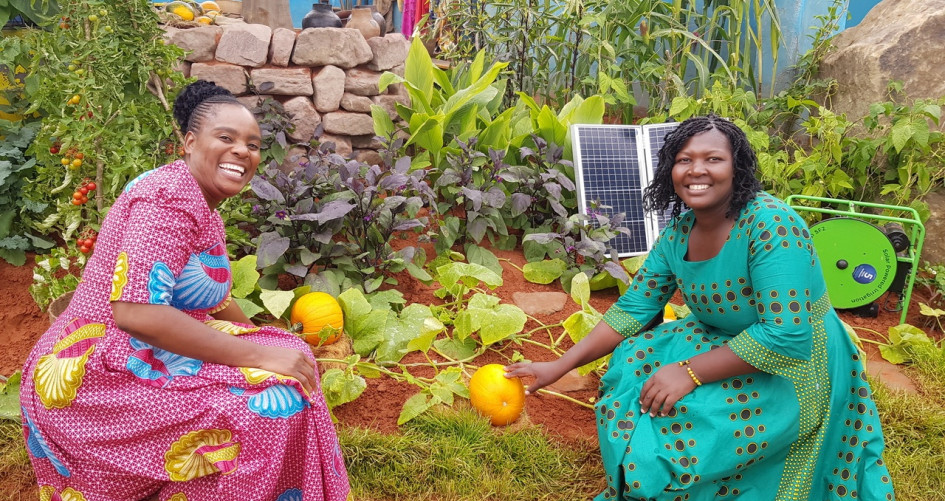(Bonn | New York City: 26 September 2019) - Today, 15 ground-breaking projects from around the world were announced as winners of the 2019 United Nations Global Climate Action Award. These projects are some of the world’s best and brightest solutions to climate change, led by communities, governments, businesses and organisations.
The celebrated projects range from an in-app mini-program that’s helped plant over 122 million trees, to a “climate positive” burger that’s taking the fast food industry by storm, to an innovative technology that produces clean electricity from the ocean.
“Announced amongst the backdrop of nations signalling their renewed determination to meet the goals of the Paris Agreement, these awards shine a light on 15 incredible examples of scalable climate action around the world,” said Niclas Svenningsen, Manager of the UN Climate Change Global Climate Action Programme.
Today’s announcement is part of a wider effort to mobilize action and ambition as national governments work toward implementing the Paris Climate Change Agreement and the Sustainable Development Goals.
The UN Global Climate Action Award is spearheaded by the Momentum for Change initiative at UN Climate Change Secretariat
The 2019 UN Global Climate Action Award winners are:
Planetary Health:
1. Making the Impossible Possible
Impossible Foods: Creating Plant-Based Alternatives to Meat | Singapore, Hong Kong, USA, Macau: Impossible Foods is creating realistic plant-based replacements for meat products. These alternatives are more sustainable and help displace market demand for meat products.
2. The App That's Planted 122 Million Trees
Alipay Ant Forest: Using Digital Technologies to Scale Up Climate Action | China: Alipay, one of the world’s most popular online payment and lifestyle platforms, has used the power of its digital technology to plant more than 122 million trees by encouraging their users to reduce their emissions, such as by biking to work, going paperless and buying sustainable products.
3. Local Action, Global Impact
Ghent en Garde: Creating Structural Change through Local Food Policy | Belgium: Ghent, a small city in northwest Belgium, was one of the first European cities to launch its own urban food policy. The policy demonstrates the potential to transform the food systems at the local urban level.
4. “Emergency Pockets” of Solar Energy
Electricians Without Borders: Providing “Emergency Pockets” of Solar energy in Dominica | Dominica: Following Hurricane Maria in 2017 in Dominica, Electricians Without Borders put forward a solution designed to use renewable energy to secure an “emergency pocket” of power -- supplying six health centers on the island with electricity in the aftermath of a natural disaster.
Climate Neutral Now:
1. Maximum Positive Climate Impact
MAX Burgers: Creating the World’s First “Climate Positive” Menu | Sweden, Norway, Denmark and Poland: The Swedish restaurant chain, Max Burgers, launched the world’s first “climate positive” menu in June 2018. Each item on Max Burgers’ menu includes a CO2e label, empowering customers to better understand the climate impact of their meal.
2. Beauty with Purpose
Natura’s Carbon Neutral Programme | Global: As the largest cosmetics manufacturer in Brazil, Natura is measuring and reducing emissions across its value chain, from the extraction of raw materials right through to their production and distribution.
3. Mission Possible
Apple’s Emissions Reduction Mission | | Global: Apple is on a mission to make its products without taking from the Earth. It has transitioned to 100% renewable energy for the electricity it uses in its offices, retail stores and data centres in 43 countries across the world, and currently is transitioning its entire supply chain to 100% renewable energy.
4. Journey to Carbon Neutrality
Infosys’ Journey to Carbon Neutrality | India: Infosys, India’s second-largest Information Technology company, is one of the first companies of its type to commit to carbon neutrality. With over 229,000 employees and clients in 46 countries, Infosys has sought to address its significant carbon footprint in all aspects of its global operations.
Women for Result:
1. Champions of Sustainability
Young Women’s Grassroots Action on Climate Change | Sub-Saharan Africa: The Campaign for Female Education launched a breakthrough initiative to train young women from poor, marginalized farming communities across sub-Saharan Africa.
2. Mother’s Love
Mothers Out Front: Mobilizing for a Liveable Climate | USA: Mothers Out Front is a movement of over 24,000 mothers in the United States, working to protect their children and communities from the impacts of climate change.
3. Leading from Within
Women’s Action Towards Climate Resilience for Urban Poor in South Asia | Bangladesh, India andNepal: Indian NGO, Mahila Housing Sewa Trust, is on a mission to organise and empower women in low-income households to increase their resilience to impacts of climate change.
4. Pioneer in Wave Energy
Eco Wave Power: Generating Clean Energy From the Ocean | Israel and Gibraltar: Eco Wave Power has developed an innovative technology that produces clean electricity from ocean and sea waves. The company is pioneering in its sector by operating the only grid-connected wave energy array floaters in the world, which is operational under a Power Purchase Agreement.
Financing For Climate Friendly Investment:
1. Equitable Clean Energy for All
Beyond the Grid Fund for Zambia | Zambia: Beyond the Grid Fund for Zambia works with the Zambian government and other stakeholders to build a more off-grid business-friendly regulatory environment.
2. Investing in Women Empowerment
Women’s Livelihood Bond Series | Global: Impact Investment Exchange is unlocking USD 150 million in capital through Women’s Livelihood Bond Series, which will empower over two million women in South and Southeast Asia. The Bond helps women access affordable credit, micro savings and insurance, agricultural inputs, as well as clean and affordable energy.
3. Collaboration and Partnership
Québec’s International Climate Cooperation Program I Canada: In 2016, the Canadian province of Québec introduced its International Climate Cooperation Programme providing climate finance and support to developing countries. It is one of the first subnational climate financing schemes, and one that is, uniquely, funded by the province’s own carbon market.
